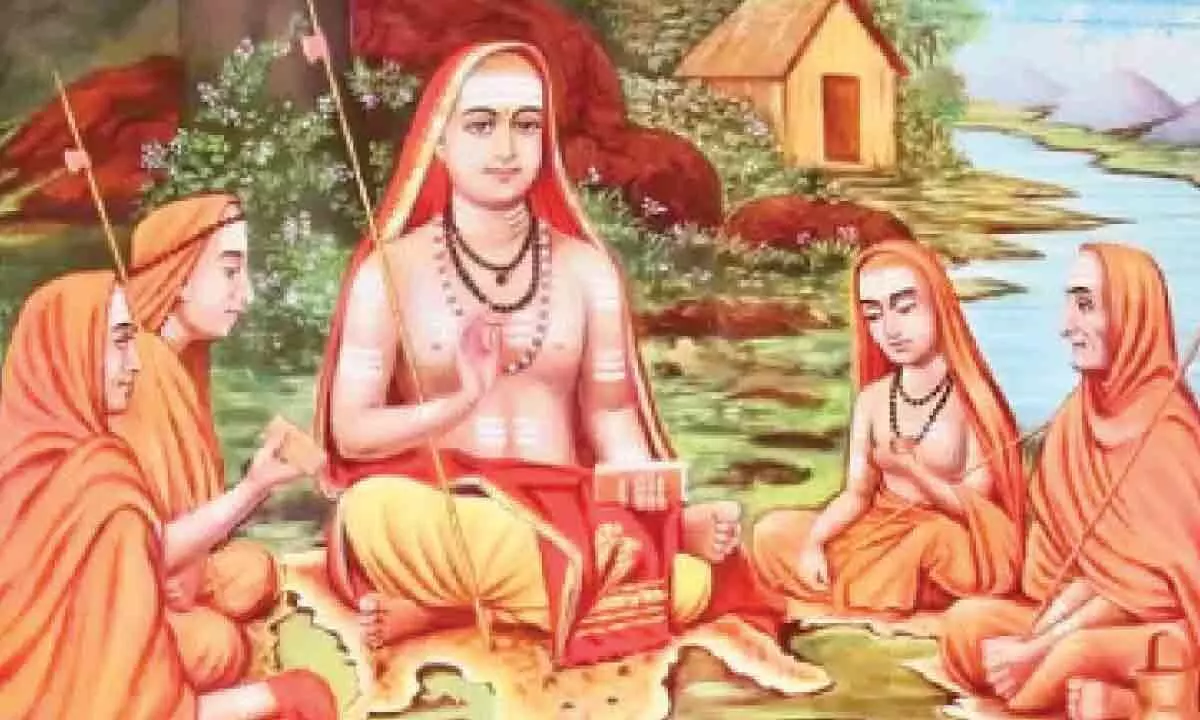The Enigma of Creation

The sages said, ‘You follow any tradition, worship any saatvic deity, attain purity and openness of mind and come’. The teacher would slowly explain the highest truth. The sages injected philosophy into all stories. If Vedanta says that consciousness has the power to manifest as creation, religion calls this power (or Shakti in Sanskrit) the consort of the Lord
Religion keeps man in a comfort zone. We go to a place of worship, tell our prayers, unwind, and feel happy, even before we attain any result. Philosophy sometimes shocks us. It does some hard talk, even about serious things like God. We get several shockers in the Gita.
There is a discussion in the Gita as to the cause of creation. As clay is the cause and pot is the effect, is there any cause for the universe? Religion would happily say that God is the cause, but the philosopher does not accept it. Vedanta says that creation is causeless and beginningless. The argument goes like this. If it is said that creation has a cause, like clay for the pot, the next question would be, ‘What is the cause of that cause?’ and then, ‘What is the cause of the second cause?’ and so on. This is a logical fallacy called infinite regress, and it is not welcome. Another question would also arise. If we say that God was the cause and he created it at some point, the question would be, ‘What was god doing till then?’ We call God the Lord of all creation. Even if we say He created the universe some thousands of years ago, it means He had nothing to lord over when creation did not exist. We cannot call him Lord, says the commentator Shankara in the Gita (13-19).
Even in the case of jiva (which is loosely translated as individual soul), Vedanta says that it is causeless and beginningless. If we do not say that he is beginningless and that he dies, it will lead to a problem. Whatever is born must die. A person is born, and with his death, the soul dies, too. A person leads a pious life and does many noble actions (good karma), but his excellent karma goes to the grave. Another person who led an impious and evil life committed several sinful actions, and with his death, the soul too dies. He has not got the punishment which he deserved. If a person is born into misery, he is punished for what he has not done. If he was born into a royal life, he got a reward for no good deed done by him. Our entire action in a lifetime is written off, and fortune or misfortune befalls for no reason. God is not judicious, then. For this reason, Vedanta accepts the idea of rebirth and says that jiva is causeless and beginningless. Even Buddhism and Jainism, which do not accept the authority of the Vedas, accepted rebirth.
We say that God is eternal, which means causeless and beginningless. As debated above, if creation and jiva are similar, we have three entities on the same footing. This, too, is not acceptable. Vedanta clarifies that jiva is essentially the same as Brahman, the Vedantic name for God. Just as Brahman is of the nature of consciousness, the jiva is of the same nature, but due to identification with the body-mind complex, he feels limited. When he investigates his nature with a pure mind, he realises he is not different from Brahman and merges with Brahman. This is what we call realisation.
We are left with two eternal things – God and creation. There cannot be two eternal and infinite entities. After much polemical debate, Vedanta concludes that Brahman (infinite consciousness) has the power to manifest what we see as the universe. Even here, we cannot say that God is the cause of the universe in the same way a potter is the cause or clay is the cause. It is just the manifesting power, which is the universe. Thus, in the case of Brahman, the potter, pot, and clay all are one. Brahman alone remains eternal, and the world becomes an appearance. Even the creator is a philosophical fiction.
How can this be explained to a layperson? The sages said, ‘You follow any tradition, worship any saatvic deity, attain purity and openness of mind and come’. The teacher would slowly explain the highest truth. The sages injected philosophy into all stories. If Vedanta says that consciousness has the power to manifest as creation, religion calls this power (or Shakti in Sanskrit) the consort of the Lord. The cosmic phenomenon of manifestation was called creator (the four-headed Brahma, not Brahman), and the knowledge for creation is Saraswati, his wife. The phenomenon of sustenance is called Vishnu, and the needed resource is his wife, Lakshmi. The phenomenon of the dissolution of the universe is called Rudra, and his power is Durga.
(Writer is former DGP, Andhra Pradesh)









